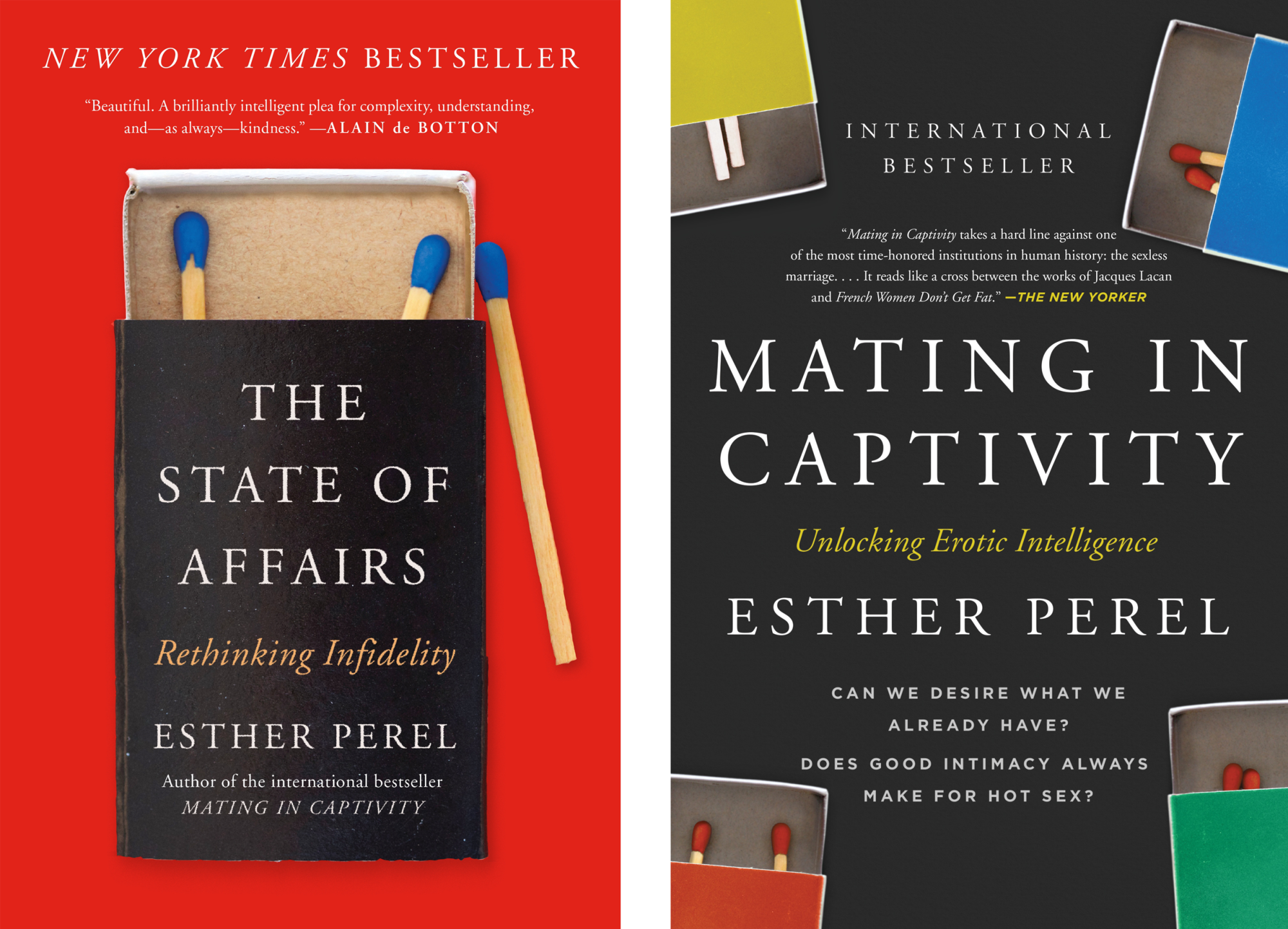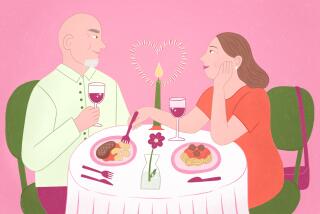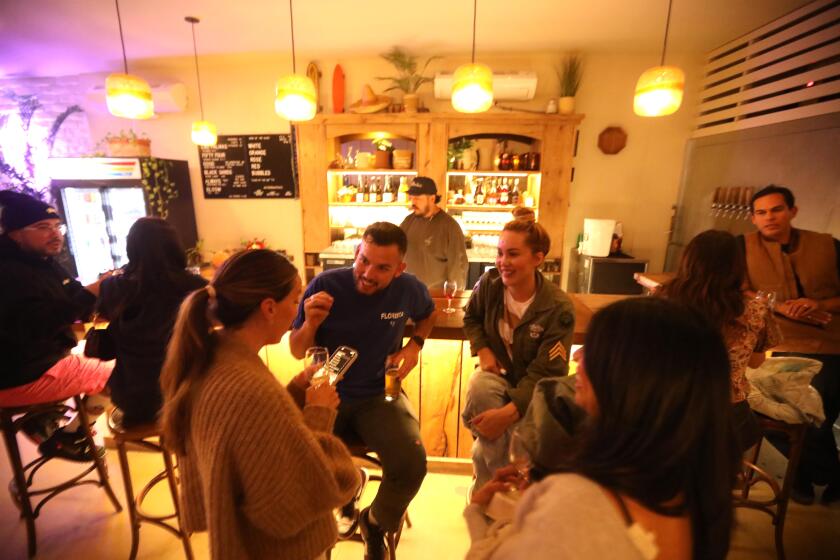
In âMating in Captivityâ and âThe State of Affairs,â Esther Perel dissects our hidden desires and impulses with intellectual rigor.
Esther Perelâs trajectory from private-practice psychotherapist to internationally renowned relationship expert is deeply entwined with technology. It was her publisherâs printing presses that distributed her 2006 breakout bestselling book, âMating in Captivity: Unlocking Erotic Intelligenceâ (HarperCollins), in more than 30 languages. The videos of her subsequent hit TED Talks brought her theories on desire and straying eyes to tens of millions of viewers. (She expanded on the latter in her 2017 book, âThe State of Affairs: Rethinking Infidelity.â) Multiple podcasts extended Perelâs therapy practice far beyond a physical office. On Instagram, Perel sprinkles tidbits of relational wisdom into the feeds of more than 2 million followers. And, coming on Sept. 17, sheâll launch two hourlong online courses designed for people to strengthen their sexual connections.
âSuddenly, you can reach people in the villages of every continent,â Perel said. âThatâs technology.â
Shelf Help is a wellness column where we interview researchers, thinkers and writers about their latest books â all with the aim of learning how to live a more complete life.
But the same technological forces that have helped Perelâs ideas reach the masses also have begun to mold and meddle with modern-day relationships: We swipe to oblivion on soul-sucking dating apps, disappear like ghosts from our romantic interestsâ lives and are lured from our partners by our smartphones at crucial moments for connection.
Itâs these unsettling phenomena Perel aims to tackle in her most recent U.S. speaking tour, âThe Future of Relationships, Love & Desire,â which she will bring to the YouTube Theater on Sept. 10.
Ahead of her visit to Los Angeles, The Times spoke with Perel about Gen Zâs sexless reputation, the limitations of intimacy on online platforms and how public shaming on social media can interfere in the bedroom.
This interview has been edited and condensed for clarity.
How do you think technology has shifted the romantic landscape since you began writing about it?

The predictive technologies that are promising to unburden us of the inconveniences of life are also creating a situation where we are gradually more anxious, not less anxious. Because we donât get to practice the things that actually make us less anxious: experimentation, meeting with the unknown, dealing with uncertainty, the unexpected, dealing with the lessons that you learn from bad choices. Thatâs what makes you less anxious, not an algorithmic perfection.
If you spend so much time with algorithmic perfections, you begin to experience and create warped expectations, and you carry those expectations for perfection into your relationships with other people, and you become less able to deal with conflict, friction, difference.
Many studies say that Gen Z is having less sex, with fewer partners. A UCLA survey from 2023 said that a little more than 47% of people between the ages of 13 and 24 feel most TV shows and movie plots donât need sexual content, and want more focus on platonic relationships. What do you make of this?
Itâs symptomatic of something that is happening in society, in our changing culture. Technology being one piece of it. Relationships are imperfect and unpredictable. So is sex. And youâre vulnerable and youâre exposed, even. And, by the way, sex is never just sex. Even if you hook up.
So youâre less prepared for the vulnerability, for the unknown, for the consequences, for the challenges of communication that sex demands. If everything needs to be negotiated, as things are today, in relationships, and there is no longer a major religious or social hierarchy that tells you how to think, you have to make your own choices and decisions yourself.
Then in order to negotiate everything, you need to be able to communicate, and those very communication skills â the ability to deal with uncertainty and the unexpected â are the very skills that are weakening in the digital age. Sex is the messiness of human life, the bumps, the smells, the caring.
This, to me, is one of the central questions for the future: How are we going to manage the messiness of human life? Thatâs the opposite of an algorithmic perfection.
But the point is not that Gen Z wants less sex. They want less sex because theyâre more isolated to begin with. They have less friends. They donât go out, they work alone the whole day. You can go on an app, you can hook up, and after a while that gets a little boring for some. So itâs not the sex, itâs everything that sex is interwoven with.
Do you think itâs possible to foster that kind of intimacy youâre describing on digital platforms?

Yes and no. For a lot of people, it allows them to meet in ways they could never have met. But I do think that this is emotional capitalism, in which you have 1,000 choices at your fingertips, in which you partake in a frenzy of romantic consumerism, in which you are afraid to commit to the good because you fear that youâre going to miss out on the perfect.
We find ourselves evaluating ourselves like products, and that commodification is soulless. Do people meet on dating apps? Absolutely. I think 60% of people these days meet online. But I think thereâs going to be a generational shift. Thereâs more and more attempts by people who are done with the apps to meet in person, even if itâs speed dating, even if itâs meeting in other circumstances, or even if itâs coming to my show.
Sex is never just sex. Even when you think itâs hit-and-run and itâs supposed to not mean anything, the effort not to make it mean something is meaningful.
— Esther Perel
My most important message in response to this is: Donât go on a date in a bar, in a restaurant, at a table face to face, that resembles a job interview where youâre asking each other a set of stale questions that tell you nothing while youâre waiting to see if youâre getting butterflies.
Go do something with your friends and bring your date along. Integrate the dating into your life. You will have 1,000 data points by just seeing how this person interacts with people, how they answer questions or how they make comments. But primarily, youâre not isolating yourself, cutting yourself off from your life to go play the lottery, to then lose, and to then have to come back with your shame, to your life, to your friends, to tell them it didnât work. We can do better.
Youâve talked about how, once you walk into the bedroom, you should throw political correctness out the window. But these days we see a lot of online shaming related to that very thing. How do conversations about sexual politics on social media influence our personal intimate lives?
Thereâs two questions in what youâre asking. One is: Is there a new type of moralizing that is occurring? And then the second one is: What is the nature of erotic desire?
I see sexuality as a coded language, as a window into the self, into a relationship that demands deep listening, and that listening is that actually sexuality is a coded language for our deepest, emotional needs, wishes, fears, aspirations, wounds. Thatâs why I always say: Sex is never just sex. Even when you think itâs hit-and-run and itâs supposed to not mean anything, the effort not to make it mean something is meaningful.
In that sense, it is irrational. Why we like certain things, we donât fully know. We donât fully know why what I like, you find disgusting. We donât fully know why this memory turned into a fantasy. We donât fully know the inner workings of the erotic mind. The brain is a black box as it is, but this adds a whole other layer to its sexual fantasies. Itâs a uniquely human production that makes no sense sometimes, because it defies our values. It defies our perception of reality. It defies our perception of who we are as good citizens.
Nobody wants some of these things in real life, but turned into play they can become highly arousing, exciting and satisfying. And it goes even further when you go into the world of kink. The erotic mind is often politically incorrect, meaning it doesnât abide by the rules of good citizenship that you yourself abide by in the rest of your life.
But letâs not be mistaken: Nobody wants to be forced into anything in real life. Because when you play it, youâre not being forced. There is no greater freedom than voluntary surrender. But âvoluntaryâ is the essential word, so itâs extremely carefully said. Because I know how tender and sensitive this is.
But thatâs one of the ways Iâve helped people make sense of their sexual lives, their preferences, for over 40 years. Consent has become a central organizing principle, because consent goes with desire. If desire is to own the wanting, in order to own it, it has to be consensual. Sometimes itâs consensual, but not necessarily wanted, because we can live with all kinds of contradictions inside of us. I say yes to you but not really to me â things like that. So consent is extraordinarily important, but it is not the only key element of sexuality. There are other pieces to this story.
TAKEAWAYS
from Esther Perel
We are shaming on a ton of different things these days. When I say weâve taken the shame to the public square of social media, itâs because this is not that different from the kind of puritanical thinking of âThe Scarlet Letterâ and excommunications of all sorts that have existed throughout history. We have often, you know, exiled people to maintain our own moral superiority in various ways.
Iâm not talking about people who deserve to be schooled for what theyâve done, or arrested. Iâm talking about how the collective and sexual scandals have forever been scandals that consolidated what was thought of as the moral fabric of the community that blamed, scolded or exiled you.
I know that the breadth of your work is not something that you can boil down to tips. But what do you want people to walk away with, to keep in their everyday life, from your speaking tour?
Iâm not here to give you a talk. Iâm here to co-create a conversation together, and like the best therapy sessions, they donât end at the end of the session. Itâs what happens afterward. Itâs who you talk to that you were sitting with and didnât know an hour before. Itâs who is waiting for you at home that you should have a difficult conversation with. And if you can internalize me and take me with you into your various areas of your life where you need some of that input, then I have done something meaningful.
Hereâs one thing I say in the tour, and I say it in the courses too: Relationships are stories. What I would like to invite you to do is to consider your stories with a new curiosity, with more nuance and ambiguity. I want you to think about what are the parts of your story, relational and sexual story, that you want to keep and develop further, and what are the parts of your relational story that you want to leave behind or change? Thatâs my invitation.

Shelf Help is a wellness column where we interview researchers, thinkers and writers about their latest books â all with the aim of learning how to live a more complete life. Want to pitch us? Email [email protected].
More to Read
Sign up for The Wild
Weâll help you find the best places to hike, bike and run, as well as the perfect silent spots for meditation and yoga.
You may occasionally receive promotional content from the Los Angeles Times.













